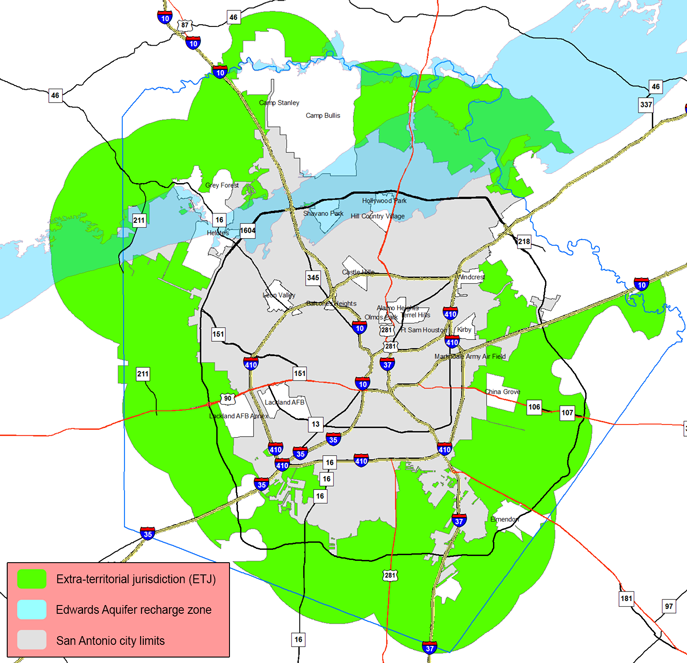A bill in the state Legislature would allow developers to clear-cut trees and ignore rules to protect the Edwards Aquifer. If passed, Senate Bill 1992 could nullify up to 410,000 acres of San Antonio's tree preservation ordinance and 46,000 acres of its aquifer protection ordinance.
In addtion, regulations for the following could also be affected:
- Impervious cover
- Stormwater
- Subdivision platting
- Military protections (lighting, noise attenuation, density)
- Signs
It is important that you contact your state Senator and Representative and tell them you are strongly opposed to SB 1992 and HB 3519.
SB 1992 (and its companion, HB 3519) would allow for any “area” of less than 200 people to petition to remove themselves from the City’s extra-territorial jurisdiction (ETJ), which is the 410,000 acre area surrounding the city limits (see drawing below). The "area" would be defined by the petitioners.
For areas greater than 200 people, the City, at its expense, must hold an election for persons in the “area” to vote on ETJ release. Should either happen, the City would lose the ability to enforce any regulations in those portions removed from the ETJ.

There is a Lot at Stake
This bill would let developers clear-cut trees, even giant heritage oaks, anywhere in the ETJ. Since the vast majority of property inside San Antonio's (CoSA's) city limits is already developed, the ETJ is where nearly all development of raw, natural land occurs. In other words, if this bill passes, CoSA's tree ordinance will be all but worthless.
In addition, developers could ignore the 15% impervious cover limit prescribed by the aquifer protection ordinance, as well as protections for creeks, caves and recharge features. There are approximately 46,000 acres of recharge zone in the ETJ. While some of that land is already developed, there are still thousands of acres of natural land available for future housing subdivisions and commercial buildings.

The Myth of "Regulation without Representation"
These bills are founded on the premise that, because residents in the ETJ cannot vote in city elections, they shouldn't be subject to city regulations. Senator Campbell calls this "regulation without representation" (watch this video starting at 1:48:40).
There are four flaws in this premise.
First, there simply is not any "regulation without representation". ETJ residents are represented by their County Commissioners on ETJ regulations. Any city development codes applicable to the ETJ are authorized by "interlocal agreements" adopted by their County Commissioners Court (example: Comal County/CoSA agreement). The fact is, ETJ residents cannot vote in city elections because they do not pay city taxes.
Second, the vast majority of ETJ residents have no city regulations to comply with. San Antonio’s tree and aquifer protection ordinances apply only to developers/builders. Other landowners in the ETJ are, in general, free to ignore them. Also, agricultural properties in the ETJ, such as farms and ranches, are exempt from city ordinances under Agriculture Code Sec. 251.005 (c).
Third, the developers and builders in CoSA's ETJ have more than ample representation at City Hall.
- Developers are well-represented by their lobbyists at City Hall, and by their advocates who serve on the Planning and Zoning Commissions.
- CoSA's Technical Advisory Committee, the committee that writes San Antonio’s land development codes, is dominated by developers and advocates for the development industries.
- ETJ landowners, and developers, wherever they live, are always free to speak before City Council and any city commissions.
Fourth, it is, primarily, companies from places like California, Michigan and Dallas that are subject to regulation in the ETJ. Since the officers and boards of these companies don't live in San Antonio or its ETJ, they wouldn't be entitled to vote in City elections regardless.